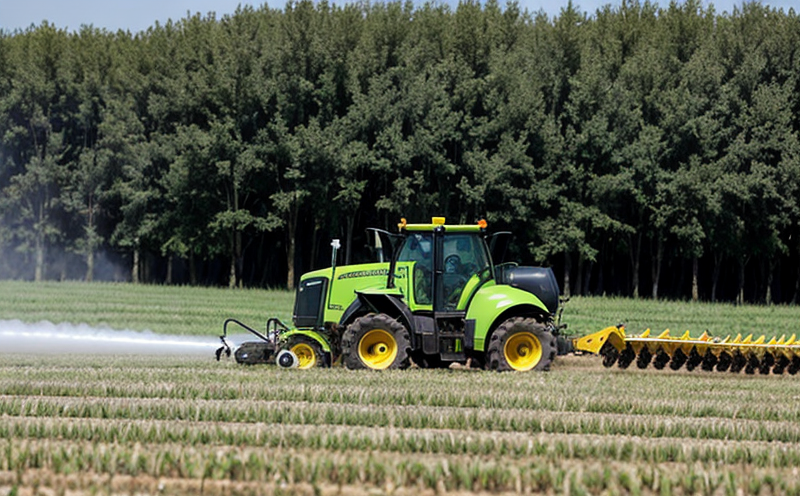Folpet Residue Testing in Crops
Understanding and ensuring safe levels of folpet residues in crops is paramount to maintaining agricultural integrity and food safety. Folpet belongs to a group of fungicides known as benzimidazoles, used primarily to control fungal diseases in various crops. However, excessive residue can pose risks to human health and the environment. Accurate and reliable testing ensures compliance with national and international regulations while supporting sustainable farming practices.
At Eurolab, our expertise lies in providing precise folpet residue testing services for a wide range of agricultural products including fruits, vegetables, grains, and ornamental plants. Our approach is designed to meet the stringent requirements set by global standards such as ISO, EN, and ASTM. By adhering to these guidelines, we ensure that our test results are both accurate and consistent across different batches.
The testing process begins with proper sample preparation. Depending on the crop type and expected residue levels, our team follows internationally recognized protocols. For instance, for fruits like apples or oranges, a representative portion is taken after washing to remove surface contaminants. With grains, a subsample of 500 grams is typically analyzed. Once prepared, samples undergo extraction using solvents followed by purification methods before analysis.
Our laboratory utilizes state-of-the-art instrumentation such as liquid chromatography coupled with mass spectrometry (LC-MS/MS) which provides high sensitivity and selectivity necessary for detecting even trace amounts of folpet residues. This technology allows us to differentiate between active ingredients, metabolites, and impurities accurately.
Acceptance criteria are set based on national and international standards like the ISO guidelines. For example, in European Union countries, limits for folpet residues vary depending upon crop type but generally fall within 0.1 - 2 ppm (parts per million) ranges. Exceeding these thresholds could indicate improper application practices or storage conditions.
In addition to regulatory compliance, accurate testing also plays a crucial role in protecting brand reputation and consumer confidence. Farmers who adhere to recommended usage rates can avoid potential legal issues associated with exceeding residue limits. Moreover, consumers purchasing produce labeled as organic or pesticide-free will trust that these claims are backed by rigorous scientific validation.
Our commitment extends beyond just providing test results; we offer comprehensive support throughout the entire process from initial consultation through final report generation. Our dedicated team works closely with clients to understand their specific needs and challenges, ensuring they receive tailored solutions that address all aspects of residue management.
Eurolab Advantages
At Eurolab, we pride ourselves on offering unparalleled quality assurance services for folpet residue testing in crops. Our team comprises highly skilled professionals with extensive experience in agricultural chemistry and analytical science. This expertise enables us to deliver reliable results consistently across all samples.
- State-of-the-Art Equipment: Leveraging cutting-edge LC-MS/MS technology ensures precision and accuracy, crucial for detecting minute traces of folpet residues.
- International Standards Compliance: Adherence to ISO, EN, ASTM standards guarantees that our findings meet global regulatory requirements.
- Comprehensive Support: From consultation to final report generation, we provide end-to-end assistance tailored specifically for each client’s unique situation.
- Fast Turnaround Times: Our efficient processes allow us to turn around results quickly without compromising on quality.
By choosing Eurolab for your folpet residue testing needs, you gain access not only to top-notch facilities but also to knowledgeable personnel committed to delivering excellence. Whether you're a small-scale farmer or large multinational corporation, our services are designed to meet the highest standards of integrity and reliability.
Why Choose This Test
Folpet residue testing is essential for several reasons, particularly in today’s era where public scrutiny over food safety continues to grow. Firstly, it helps ensure compliance with strict regulatory requirements set forth by various governing bodies worldwide. Non-compliance can lead to severe penalties including fines and product recalls which could severely impact business operations.
Secondly, conducting regular residue tests allows farmers to monitor their application practices effectively. If residues exceed recommended limits, corrective actions can be taken immediately preventing further contamination of crops. This proactive approach fosters responsible stewardship towards natural resources enhancing sustainability efforts within the agricultural sector.
A third benefit pertains to consumer trust and satisfaction. As mentioned earlier, many consumers prefer organically grown produce believing it to be free from harmful chemicals. Demonstrating adherence to rigorous testing protocols adds credibility to such claims fostering confidence among buyers.
Lastly, accurate residue testing contributes significantly towards maintaining public health by minimizing exposure to potentially hazardous substances. By setting safe limits for folpet residues, regulatory authorities aim at protecting consumers from potential adverse effects of excessive consumption over prolonged periods.
Use Cases and Application Examples
- Crop Monitoring: Regular testing helps farmers keep track of folpet application rates ensuring optimal crop health without causing harm.
- Compliance Verification: Regulatory bodies often request independent third-party verification to confirm that imported goods meet specified standards.
- Packaging Decisions: Understanding the residue levels allows companies to make informed decisions regarding packaging materials used during transportation and storage.
- Distribution Channels: Information about residual levels enables distributors to prioritize certain products based on their safety profile.
In summary, folpet residue testing serves multiple purposes ranging from enhancing compliance with regulatory frameworks to safeguarding public health. It plays a vital role in the agricultural industry ensuring safe and sustainable practices.





